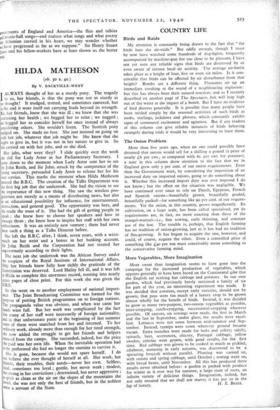More Vegetables, More Imagination More sweat than imagination seems to
have gone into the campaign for the increased production of vegetables, which appears generally to have been based on the Continental gibe that the English eat nothing but cabbage and potatoes. In our own garden, which had previously barely sustained a family of six for part of the year, an interesting experiment was made. It was decided that potatoes, except early varieties, should not be grown; that peas were too much of a luxury crop to be grown almost wholly for the benefit of birds. Instead, it was decided to grow as many two-purpose, two-season vegetables as possible, inter-cropping, catch-cropping, successional-cropping wherever possible. Of carrots, six sowings were made, the first in March and the last in September, under glass; the results were excel- lent. Lettuces were not sown between mid-summer and Sep- tember. Instead, turnips were sown wherever ground became vacant. Extra trenches were made for leeks and celery; salsify, spinach, beet, scorzonera, chicory, Portugal cabbage, yellow swedes, celeriac were grown, with good results, for the first time. Red cabbage was grown to be cooked as much as pickled; calabrese, maturing in early autumn, was discovered to be a sprouting broccoli without parallel. Planting was carried on, with onions and spring cabbage, until October ; sowing went on, with broad beans, until November. All this has produced three results never obtained before: a garden as packed with produce for winter as it ever was for summer, a large store of roots, an infinite variety of delicious things. Imagination, indeed, has not only ensured that we shall not starve; it has put us in the


























































 Previous page
Previous page